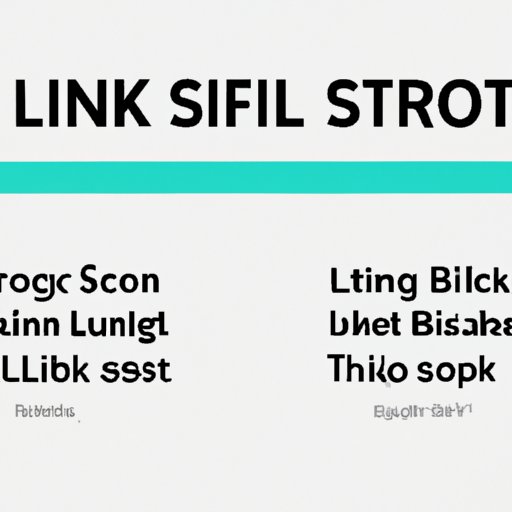
Shortening Links: Making Them More Manageable and Effective
Links can be incredibly useful for sharing information and directing people to resources on the internet. However, sometimes links can be excessively long and difficult to share or even remember. Fortunately, there are many methods for shortening links to make them more manageable and effective. In this article, we will explore different strategies for shortening links, including using a URL shortener service, creating a custom short domain, utilizing Bitly, installing a browser extension, customizing your link slug, and formatting links for social media.
Using a URL Shortener Service
One of the most popular ways to shorten a link is to use a URL shortener service. These services allow you to input a long link, which they then automatically shorten into a much more manageable format.
Some of the most popular URL shortener services include Bitly, TinyURL, and Rebrandly. Each of these services offers a slightly different approach to link shortening. For example, Bitly allows you to customize your shortened links, while TinyURL offers a bookmarklet that can quickly generate a shortened link from your browser. On the other hand, Rebrandly allows you to create custom domains for your shortened links.
Using a URL shortener service can be incredibly convenient, especially if you need to share links on a regular basis. However, there are some disadvantages to consider. Shortened links can sometimes look suspicious, which can lead to people being hesitant to click on them. Additionally, some URL shorteners may include ads in their shortened links, which can be distracting or annoying for users.
Creating Your Own Short Domain
If you’re interested in using a more customized approach to link shortening, you may want to consider creating your own short domain. This involves purchasing a domain name and using it to create short links that are more closely aligned with your personal or business brand.
Using your own short domain can offer several benefits. It can make your links look more professional and trustworthy, particularly if you’re using them for business purposes. Additionally, you have more control over the link customization and tracking data.
However, there are also some potential drawbacks to consider. Creating your own short domain can be more expensive and time-consuming than using a URL shortener service. Additionally, if you’re not familiar with domain setup and configuration, it may be challenging to get started.
Utilizing Bitly
Bitly is a popular link shortening service that offers a wide range of features to help you manage and customize your links. One of the most significant benefits of using Bitly is that you can not only shorten links, but you can also track clicks and performance data.
To use Bitly, simply navigate to the website and input the long link that you want to shorten. Bitly will automatically generate a shortened link, which you can then customize if you choose. You can also create links with your own custom domains, which can be particularly useful if you want to use your short links for branding purposes.
Beyond simply shortening links, Bitly offers a suite of analytics tools to help you track engagement and results. You can use these insights to optimize the effectiveness of your links and improve your overall online presence.
Utilizing a Browser Extension
Another option for link shortening is to use a browser extension. These extensions allow you to shorten links directly from your browser, without having to navigate to a separate website or service.
Some popular browser extensions for link shortening include Google URL Shortener, Bitly, and TinyURL Generator. These extensions typically add a shortcut or button to your browser window, which you can click to generate a shortened link from the page you’re currently on.
While using a browser extension can be convenient, there are some limitations to consider. Not all extensions work with all browsers, and some may be more challenging to install or use than others. Additionally, some extensions may not offer the same level of customization or tracking data as other link shortening methods.
Customizing Your Link Slug
When you shorten a link, the resulting URL typically includes a random string of characters that are generated by the link shortener service. However, many link shorteners also allow you to customize the “slug” portion of the link, which is the part that comes after the domain name.
Customizing your link slug can be a useful way to create more memorable and recognizable links. It can also help you optimize your links for search engine rankings, since you can use targeted keywords in your slug.
To customize your link slug, you can typically do so directly within the link shortener service that you’re using. Some platforms may also allow you to adjust the slug within your settings or preferences.
Formatting Your Links for Social Media
When it comes to sharing links on social media platforms, there are some additional considerations to keep in mind. Social media platforms often have specific requirements for link formatting, and customizing your links for specific platforms can help improve their effectiveness and engagement.
For example, on Twitter, it’s best to keep your links as short as possible to leave more room for your message. On Facebook, including an image with your link can help improve engagement. On LinkedIn, including personal commentary with your links can help increase clicks and shares.
When formatting your links for social media, it’s essential to consider the platform you’re using and the type of content you’re sharing. By customizing your links for each platform, you can help maximize their impact and ensure that they reach the right audience.
Conclusion
Link shortening can be an incredibly useful tool for managing and sharing links effectively. Whether you’re using a URL shortener service, creating your own short domain, or customizing your link slugs, there are many methods to choose from. By experimenting with different strategies and finding what works best for your needs, you can optimize your link sharing and improve your overall online presence.





